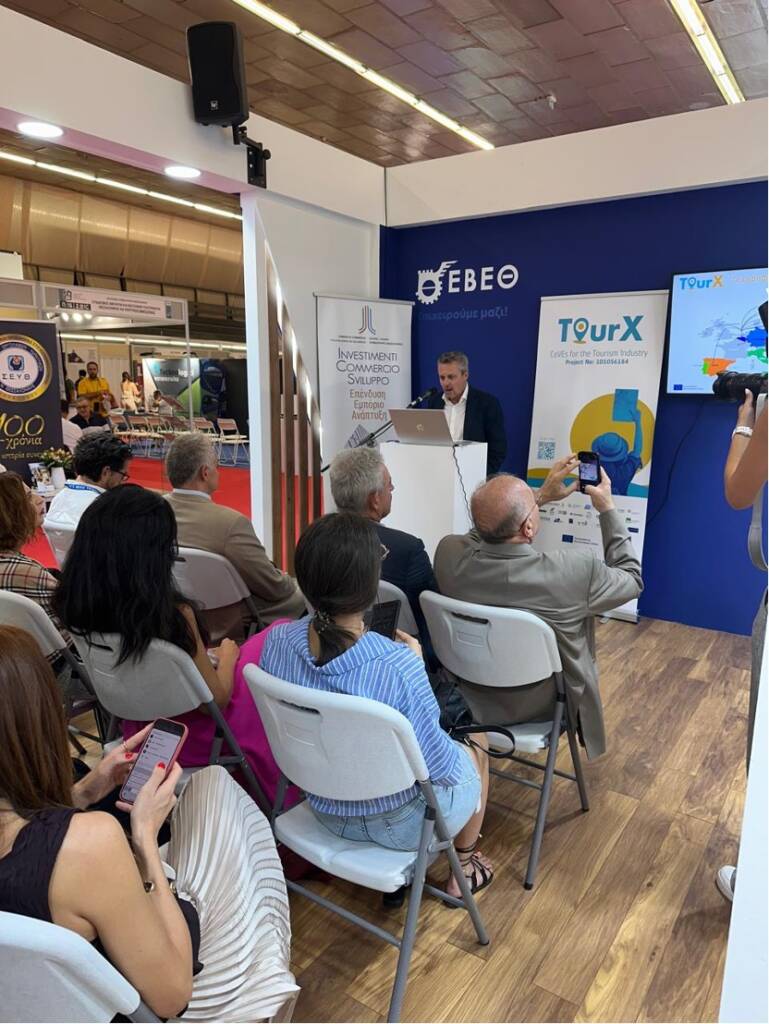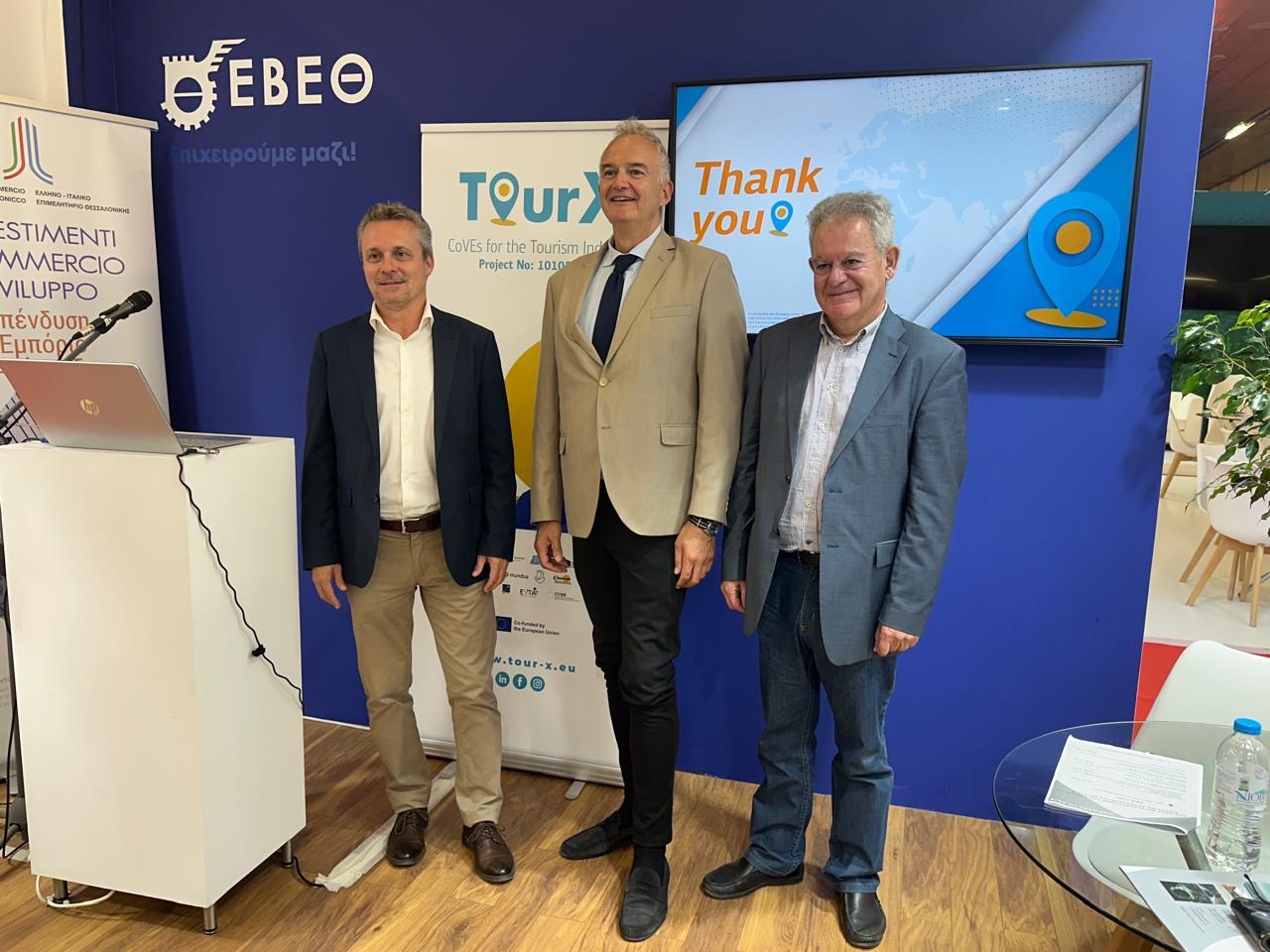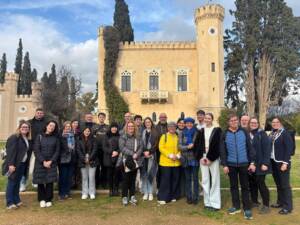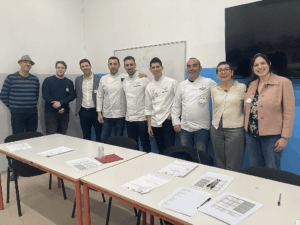Presentation of the Innovative Cove TOUR-X Project at the 89th Thessaloniki International Fair: Europe’s Strategy for Education and Skills in Tourism
The European project TOUR-X – Centre of Vocational Excellence for Tourism (CoVEs for the Tourism Industry) was presented at the 89th Thessaloniki International Fair, in an event organized by the Greek-Italian Chamber of Commerce of Thessaloniki in collaboration with the Thessaloniki Chamber of Commerce and Industry (TCCI).
The project, co-funded by the European Union with a budget of €4,967,613.60, brings together 23 partners from 7 countries and has received a high evaluation score of 86/100. It started in June 2022, with a duration of 48 months, and is already at an advanced stage of implementation.
Tourism is a key pillar of the European economy, contributing 3.9% to the EU GDP (or 17% of the services sector), employing 27.3 million people, and involving more than 2.3 million tourism enterprises. At the same time, the EU accounts for 40% of international arrivals and 31% of international revenues. However, the sector faces critical challenges: staff shortages, skills mismatches, and lack of coordination in tourism education. TOUR-X was created to respond to these needs, bringing together educational institutions, businesses, and public bodies with the aim of promoting excellence, innovation, and sustainable tourism development.
The main objective of the project is to develop a bottom-up approach to excellence in the tourism sector, where cooperating education providers enhance their ability to quickly adapt the supply of skills to evolving economic and social needs.
As part of its innovative actions, the project includes, among others: pilot laboratories for tourism education and innovation, an online hub (TourX platform) for all outputs, open to professionals and trainers, mechanisms for upskilling and reskilling employees and SMEs, training and certification of trainers, targeted programs certifying skills that bring immediate value to the labor market, and Knowledge Triangles in Greece, Italy, Spain, and Germany, connecting Vocational Education and Training providers, business associations, and regional authorities.
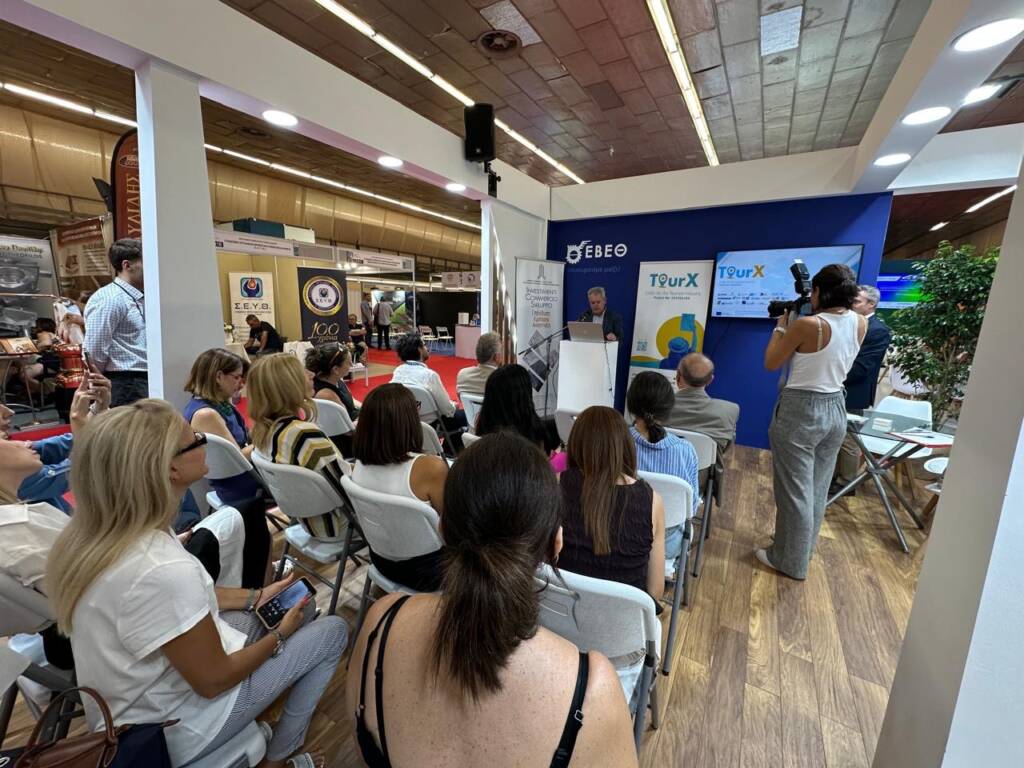
In the case of Greece, the Knowledge Triangles bring together educational institutions such as AKMI INTERNATIONAL, business associations, the Institute of Small Enterprises of GSEVEE, as well as the Regional Development Fund of Attica, acting as the regional public authority of Attica, with the contribution of the Hellenic Open University as the academic partner.
Presenting the project and its outcomes, Mr. Marco Della Puppa, Secretary General of the Greek-Italian Chamber of Thessaloniki, stated:
“TOUR-X is already beyond the halfway point of its implementation, achieving significant results. Our main goal is to modernize tourism education, close skills gaps, and create a workforce that is better prepared for the challenges of the future. Through the ‘Knowledge Triangles’ we bring together universities, education providers, businesses, and regions, building new strategic partnerships”.
Referring to Greece, he noted:
“We already have concrete results, particularly in the Region of Attica, with the creation of the new DMMO ‘The Greater Athens Region’, which demonstrates how local governance can strengthen tourism strategy. Similarly, the model of the Veneto Region in Italy is a good practice: by creating Destination Management Organizations (DMOs), it expanded tourism beyond Venice, connected universities, chambers of commerce, and hotel associations, while at the same time prioritizing sustainability and reducing overtourism”.
On his part, Mr. Lambros Kaoudis, Vice-President of the Greek-Italian Chamber of Thessaloniki, referred to the added value that the TOUR-X program brings to tourism, emphasizing that it received one of the highest scores in the EU, confirming its strategic importance.
“Tourism is a key pillar both of the country’s GDP and of Central Macedonia. The European program brings European countries together, and the goal is to have better-trained professionals, which will lead to more and higher-quality jobs”.
Addressing the event, Mr. Antonios Boumpoulas, Deputy Director of Statistics, Studies and Research of the Thessaloniki Chamber of Commerce and Industry (TCCI), underlined:
“TOUR-X creates cooperation networks – the Knowledge Triangles – in countries with top tourism potential, including Greece. For the Region of Central Macedonia, where tourism is a significant pillar of the economy, involving a large number of small and large enterprises, offering thousands of jobs and generating income, the project constitutes another important lever for the further development of the Region’s Tourism Sector, to the benefit of both businesses and citizens”.
Partners with an international dimension
The program involves partners from Belgium (2 educational organizations, 1 social partner, 1 chamber of commerce), Greece (Region of Attica, an educational organization, the Greek-Italian Chamber of Thessaloniki, a sectoral association), Italy (Region of Veneto, 2 educational organizations, 1 chamber of commerce), Spain (a Region, 2 Federations of VET Associations, 1 Sectoral Confederation), Germany (an educational organization), Portugal (a university and an SME), and China (an NGO in the VET sector, contributing expertise from Asia).
The project’s international dimension is strengthened through staff exchanges, study visits to Greece, Italy, Spain, and Germany, as well as the transfer of good practices from China, where universities and businesses work closely together in training new professionals.
Social and economic impact
TOUR-X seeks to enhance the image of Vocational Education and Training in tourism, provide modern tools and opportunities to young people, trainers, and businesses, build a better-trained workforce that is competitive and adaptable, contribute to sustainability and the development of new forms of tourism, and offer solutions that ensure long-term financial viability and knowledge transfer.
With strong partners, innovative actions, and practical examples of implementation, TOUR-X emerges as a catalyst for the modernization of tourism education and the strengthening of the competitiveness of European tourism.
You can find more news:
https://www.ris3rcm.eu/tour-x-kentro-aristeias-gia-ton-tourismo-kainotomia-kai-ekpaidefsi/
https://debbiestravel.gr/epiloges/ellino-italiko-epimelitirio-thessalo/
https://www.italchamber.gr/it/tour-x-project-at-the-89th-thessaloniki-international-fair/
The integration of AI into continuing education for teachers is not a fad, but a strategic necessity. Today’s learners need future-proof skills. Tomorrow’s world of work requires an understanding of AI and the ability to work with intelligent systems. Teachers are the key to this – but only if they are supported in their own skills development through structured, practical learning paths.
The latest results from the prompts2teach project show what makes an effective AI integration path.
An effective learning path for AI integration consists of several key elements that together form a consistent and practical concept:
1. Awareness & orientation
Teachers must first understand what AI is – and what it is not. This includes basic terms, practical examples and implications for their own subject area.
2. Experimentation & trial and error
AI is learned through application. Training rooms, learning labs and micro-training courses should enable the use of tools such as ChatGPT, adaptive learning systems or AI image generators.
3. Didactic integration
How can AI be meaningfully integrated into lesson planning? From personalised feedback to simulation-based customer conversations – there are many didactic application scenarios.
4. Ethics & critical reflection
What are the risks of AI? How do algorithms influence decisions? Teachers need tools to evaluate AI competently and responsibly.
5. Networks & communities of practice
AI integration thrives on exchange. Networks such as TourX create space for cross-sector cooperation and sustainable implementation.
6. Certification & recognition
Learning processes must be visible and assessable – for example, through micro-credentials and digital educational certificates, not just through certificates of participation. This increases motivation, transparency and mobility.
